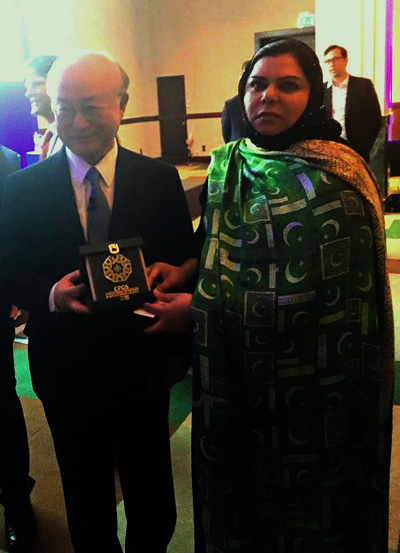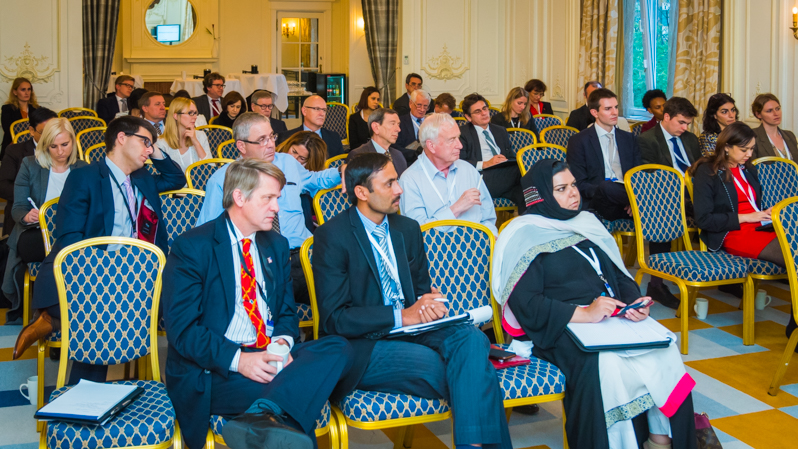
President CPGS, Senator Sehar Kamran (TI) with Director General, IAEA Yukiya Amano
President Centre for Pakistan and Gulf Studies (CPGS), Senator Sehar Kamran (TI) led a two-member CPGS delegation participating in the two day European Union Non-Proliferation and Disarmament Conference on 11-12th November, organized by the International Institute for Strategic Studies (IISS) in Brussels. The conference was attended by 300 experts including the Director General International Atomic Energy Agency (IAEA), Yukiya Amano as well as other prominent dignitaries and experts. The speakers and participants discussed issues related to nuclear proliferation and other threats. The Iranian Nuclear deal was discussed at some length, with most participants being of the view that the deal would prove helpful for fostering peace and stability in the stability in the region.
Another current issue under debate was the role of nuclear weapons in light of the Ukraine crisis, and the resultant rise in tensions between Russia and the USA. Additionally, speakers from across the globe emphasized on further nuclear weapons reductions in P-5 nuclear weapons countries, especially the US and Russia. In this context, the imminent speakers and participants suggested substantive, tangible and concrete steps to prevent the further proliferation of nuclear weapons.
President CPGS, Senator Sehar Kamran, while representing the Centre and Pakistan, met with distinguished guests including DG IAEA Yukiya Amano, Adviser to the Vice President and Head of the Atomic Energy Organization of Iran, Ambassador Ali Asghar Soltanieh, Pakistan’s Ambassador to Belgium H.E. Ms Naghmana Hashmi, IISS Director Non-Proliferation and Disarmament Programme Mr Mark Fitzpatrick and many others.
 Senator Sehar Kamran also intervened in discussion and raised the issue of double standards and discriminatory policies of a ‘politically-dominated’ nuclear regime regarding the civil nuclear energy deal. She stated that major powers have adopted a ‘discriminatory’ approach, providing a civilian deal to a select few, while Pakistan, which has strong nuclear fuel cycles expertise in addition to extensive experience in handling and running nuclear power plants, is being denied the same as a result of the lack of a criteria-based aproach.
Senator Sehar Kamran also intervened in discussion and raised the issue of double standards and discriminatory policies of a ‘politically-dominated’ nuclear regime regarding the civil nuclear energy deal. She stated that major powers have adopted a ‘discriminatory’ approach, providing a civilian deal to a select few, while Pakistan, which has strong nuclear fuel cycles expertise in addition to extensive experience in handling and running nuclear power plants, is being denied the same as a result of the lack of a criteria-based aproach.
During discussions with Mr. Fitzpatrick, Senator Kamran (TI) highlighted the urgency of Pakistan’s energy needs and importance of access to civil nuclear technology in this context. Mr Fitzpatrick praised the role of CPGS in initiating a project as vitally important as ‘JOHAR “Contemporary Debate in the 2nd Nuclear Age”’. He added it is positive that today there is talk of a Civil Nuclear deal with Pakistan; when he first raised the possibility of offering such a program at Vienna in early 2015, many eyebrows were raised.
He further reminisced that the first time nuclear veteran Dr. Peter Lavoy discussed a possible ‘Pakistan-USA’ nuclear deal was at the CPGS seminar on “Nuclear Non-proliferation, Arms Control and Disarmament: Contemporary Challenges and Prospects”, held on May 7, 2014. Now that a narrative has been built, with an increasing number of scholars, including Toby Dalton and Michael Krepon, genuinely considering and promoting the idea of “a normal Nuclear Pakistan”, talks on civil nuclear relations between Pakistan and the US can continue to improve. The new debates in this context will be regarding procedures and conditions, which can be negotiated.


